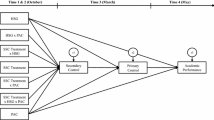Abstract
Many factors are known to be associated with psychological well-being. However, it is much less clear whether those factors actually cause well-being and, hence, whether there is any practical value in trying to manipulate those factors to increase well-being. The proposed study addresses both the theoretical and practical issues by testing the effectiveness of an empirically-derived, brief psychological intervention to increase well-being in a non-clinical, unselected sample. The intervention focused on developing goal setting and planning (GAP) skills, which are known to be linked to well-being, potentially have widespread effects, and are amenable to intervention. Within a quasi-experimental design, participants received three, 1-h, group sessions (Study 1) or completed the programme individually in their own time (Study 2). Those taking part in the intervention, both individually and in a group, showed significant increases in subjective well-being, compared to their respective control groups not receiving the intervention. The results provide preliminary support for the view that (a) goal setting and planning skills have a causal link to subjective well-being and (b) that such skills can be learned to enhance well-being.
Similar content being viewed by others
Notes
Due to an administrative error, four participants did not complete the SWLS measure or the additional variables.
The lack of a significant group × time interaction on PA suggests that the significant change in PA in GAP participants is not reliably different from the change in the controls; however, it is reported here along with all the other comparisons for completeness.
References
Brunstein, J. C., Schultheiss, O. C., & Grassman, R. (1998). Personal goals and emotional well-being: The moderating role of motive dispositions. Journal of Personality and Social Psychology, 75, 494–508.
Cantor, N., & Sanderson, C. A. (1999). Life task participation and well-being: The importance of taking part in daily life. In D. Kahneman, E. Diener, & N. Schwartz (Eds.), Well-being: The foundations of hedonic psychology (pp. 230–243). New York: Russell Sage Foundation.
Carver, C. S., & Scheier, M. F. (1990). Origins and functions of positive and negative affect: A control process view. Psychological Review, 97, 19–35.
Diener, E., Emmons, R. A., Larsen, R. J., & Griffen, S. (1985). The satisfaction with life scale. Journal of Personality Assessment, 49, 71–75.
Diener, E., Lucas, R. E., & Oishi, S. (2002). Subjective well-being: The science of happiness and life satisfaction. In C. R. Snyder & S. J. Lopez (Eds.), Handbook of positive psychology. New York: Oxford University Press.
Emmons, R. A., & McCullough, M. E. (2003). Counting blessings versus burdens: An experimental investigation of gratitude and subjective well-being in daily life. Journal of Personality and Social Psychology, 84, 377–389.
Kahneman D., Diener E., & Schwartz, N. (1999). Well-being: The foundations of hedonic psychology. New York: Russell Sage Foundation.
Locke, E. A. (2002). Setting goals for life and happiness. In C. R. Snyder & S.J. Lopez (Eds.), Handbook of positive psychology. New York: Oxford University Press.
Loewenstein, G. F., Weber, E. U., Hsee, C. K., & Welch, N. (2001). Risk as feelings. Psychological Bulletin, 127, 267–286.
Lyubomirsky, S., King, L., & Deiner, E. (2005). The benefits of frequent positive success: Does happiness lead to success? Psychological Bulletin, 131, 803–855.
Lyubomirsky, S., Sheldon, K. M., & Schkade, D. (2005). Pursuing happiness: The architecture of sustainable change. Review of General Psychology, 9, 111–131.
MacLeod, A. K., & Conway, C. (2005). Well-being and the anticipation of positive future experiences: The role of income, social networks and planning ability. Cognition and Emotion, 19, 357–374.
Nezlek, J. B. (2001). Daily psychological adjustment and the planfulness of day-to-day behavior. Journal of Social and Clinical Psychology, 20, 452–475.
Prenda, K. M., & Lachman, M. E. (2001). Planning for the future: A life management strategy for increasing control and life satisfaction in adulthood. Psychology and Aging, 16, 206–216.
Scholnick, E. K., & Friedman, S. L. (1993). Planning in context: Developmental and situational considerations. International Journal of Behavioral Development, 16, 145–167.
Schmuck, P., & Sheldon, K. M. (Eds.). (2001). Life goals and well-being. Towards a positive psychology of human striving. Seattle: Hogrefe & Huber.
Seligman, M. E. P. (2002). Authentic happiness. New York: Simon & Schuster.
Seligman, M. E. P., Steen, T. A., Park, N., & Peterson, C. (2005). Positive psychology progress: Empirical validation of interventions. American Psychologist, 60, 410–421.
Sheldon, K. M, & Elliott, A. J. (1999). Goal striving, need satisfaction, and longitudinal well-being: The self-concordance model. Journal of Personality and Social Psychology, 76, 482–497.
Sheldon, K. M., Kasser, T., Smith, K., & Share, T. (2002). Personal goals and psychological growth: Testing an intervention to enhance goal-attainment and personality integration. Journal of Personality, 70, 5–31.
Watson, D., Clark, L. A., & Tellegen, A. (1988). Development and validation of brief measures of positive and negative affect: The PANAS scales. Journal of Personality and Social Psychology, 54, 1063–1070.
Author information
Authors and Affiliations
Corresponding author
Additional information
This research was supported by a grant from the Economic and Social Research Council of Great Britain to Andrew MacLeod (RES-000-22-0357).
Appendix: Outline of GAP sessions
Appendix: Outline of GAP sessions
1.1 Session 1:
-
Introductions/Welcome/Explanation of the sessions and manual
-
Explanation of key concepts (well-being, goals).
-
Selecting and refining goals
-
Envisaging goals
-
Planning to achieve goals—what constitutes good plans and developing plans of action
-
Summary and homework
1.2 Session 2 (1 week later)
-
Review of plan implementation
-
Putting goals in perspective
-
Obstacles to goal progress—identifying obstacles and solutions
-
Pros and cons of implementing plan steps
-
Summary and homework
1.3 Session 3 (2 weeks later)
-
Review of plan implementation
-
Overview of material covered
-
Maintaining progress
-
pros and cons of using GAP approach
-
dealing with black and white thinking
-
focusing on the path rather than the goal
-
Rights and permissions
About this article
Cite this article
MacLeod, A.K., Coates, E. & Hetherton, J. Increasing well-being through teaching goal-setting and planning skills: results of a brief intervention. J Happiness Stud 9, 185–196 (2008). https://doi.org/10.1007/s10902-007-9057-2
Received:
Accepted:
Published:
Issue Date:
DOI: https://doi.org/10.1007/s10902-007-9057-2




